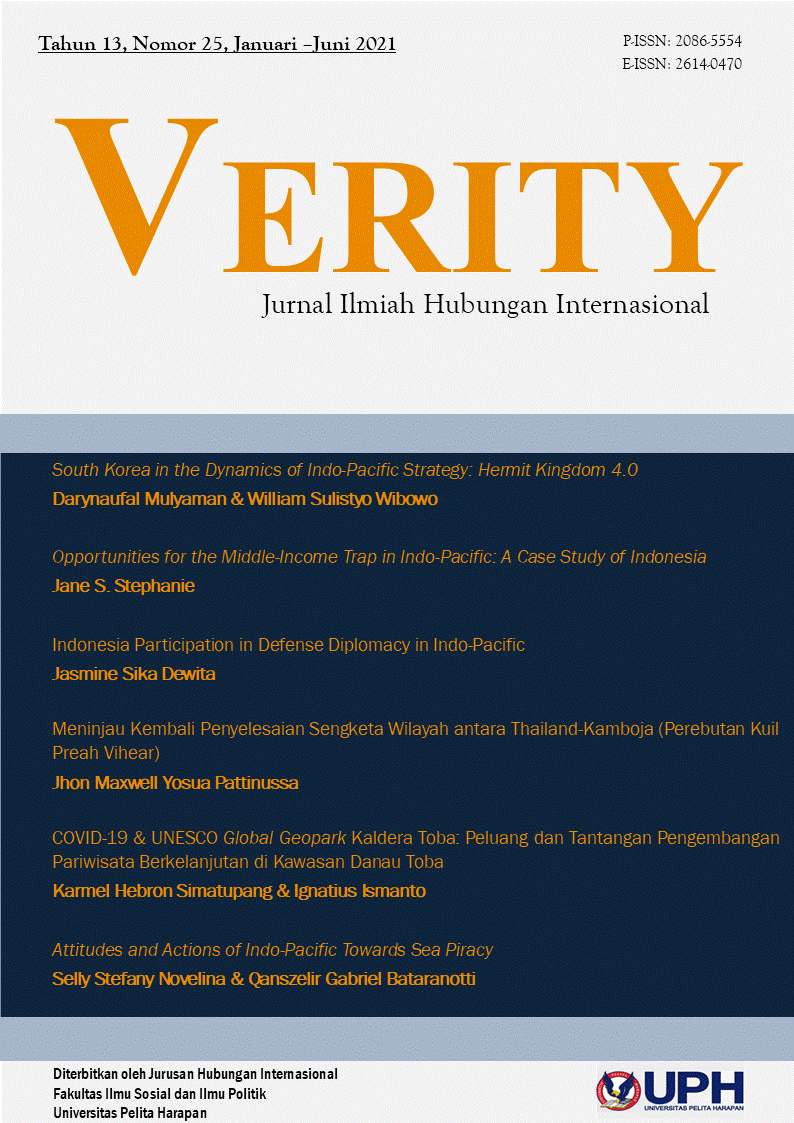COVID-19 & UNESCO GLOBAL GEOPARK KALDERA TOBA: PELUANG DAN TANTANGAN PENGEMBANGAN PARIWISATA BERKELANJUTAN DI KAWASAN DANAU TOBA [COVID-19 & UNESCO GLOBAL GEOPARK TOBA CALDERA: OPPORTUNITIES AND CHALLENGES FOR SUSTAINABLE TOURISM DEVELOPMENT IN LAKE TOBA AREA]
DOI:
https://doi.org/10.19166/verity.v13i25.4469Λέξεις-κλειδιά:
Covid-19, UGG Kaldera Toba, Toba Caldera UGG, Pariwisata Berkelanjutan, Sustainable Tourism, Kawasan Danau Toba, Lake Toba RegionΠερίληψη
In the amidst of the Covid-19 pandemic, Toba Caldera was designated as a member of the UNESCO Global Geopark (UGG), in July 2020. This status becomes a very important opportunity and challenge in encouraging the development of sustainable tourism in the super-priority tourism destination of Lake Toba. This is following the demands of the new normal adaptation in the era of Covid-19. Thus, this paper aims to study and analyze how the status of Toba Caldera UGG amid the Covid-19 pandemic can be used as a strategy to strengthen the implementation of sustainable tourism development based on environmental, cultural and biological conservation. The research method was carried out with a descriptive qualitative approach, by conducting a literature study and interviews. In this study, it was found that the new normal of tourism in the Covid-19 pandemic era was in line with the spirit of conservation, restoration and revitalization of the Toba Caldera UGG geo-sites and thus strengthening the implementation of sustainable tourism in the Lake Toba region. In welcoming a better new normal era, the Government should not hesitate to take policies that prioritize environmental sustainability and discontinue the obsolete pattern of being greedy that harms the environment.
Bahasa Indonesia Abstract: Di tengah pandemi Covid-19, Geopark Kaldera Toba ditetapkan menjadi anggota UNESCO Global Geopark (UGG), Juli 2020 yang lalu. Status ini menjadi peluang dan tantangan sangat penting dalam mendorong pengembangan pariwisata berkelanjutan di destinasi superprioritas Kawasan wisata Danau Toba. Hal ini bersesuaian dengan tuntutan adaptasi new normal dalam era pandemi Covid-19. Paper ini dengan demikian bertujuan untuk melakukan studi dan analisis bagaimana status UGG Kaldera Toba di tengah pandemi Covid-19 dapat menjadi siasat memperkuat implementasi pembangunan pariwisata berkelanjutan yang berbasis konservasi lingkungan, budaya dan hayati. Metode penelitian dilakukan dengan pendekatan kualitatif deskriptif, dengan melakukan studi literature dan wawancara. Dalam penelitian ini ditemukan bahwa new normal pariwisata era pandemi Covid-19 sejalan dengan semangat konservasi, restorasi dan revitalisasi situs-situs UGG Kaldera Toba dan dengan demikian dapat memperkuat implementasi pariwisata berkelanjutan di Kawasan Danau Toba. Dalam menyongsong era new normal yang lebih baik, agar Pemerintah tidak perlu ragu mengambil kebijakan yang mendahulukan kelestarian lingkungan dan menghentikan pola lama yang serakah pada lingkungan.
Αναφορές
Ardika, I. G. (2018). Pembangunan berkelanjutan: Rintis Jalan Lewat Komunitas. Jakarta: PT. Kompas Media Nusantara.
Chesner, C. A. (2011). The Toba Caldera Complex. Quaternary International, 258, 5-18. https://doi.org/10.1016/j.quaint.2011.09.025
Financial Times. (2020, April 4). The pandemic is a portal. Retrieved from https://www.ft.com/content/10d8f5e8-74eb-11ea-95fe-fcd274e920ca
Investor Daily. (2020). Covid-19, Tragedi Ekologis. Retrieved from https://investor.id/editorial/covid19-tragedi-ekologis
Keohane, R. O. (1984), After Hegemony: Cooperation and Discord in the World Political Economy. Princeton, NJ: Princeton University Press.
Kompas. (2021, June 14). Catat, Daftar Hotel Bersertifikasi CHSE di 5 Destinasi Super Prioritas. Retrieved from https://travel.kompas.com/read/2021/06/14/172753127/catat-daftar-hotel-bersertifikasi-chse-di-5-destinasi-super-prioritas?page=all
Nyoman, S. A. (2017). Buka Ajar Pariwisata Berkelanjutan. Universitas Udayana: Sustain Press.
O’Neill, K. (2009). The Environment and International Relations. New York: Cambridge University Press.
Riddell, B. (2004). Research for Development: A Practical Guide by Sophie Laws with Caroline Harper and Rachel Marcus. Journal of Development Studies London, 40, 185.
Sigala, M. (2020). Tourism and COVID-19: Impacts and implications for advancing and resetting industry and research. Journal of Business Research, 117, 312-321. https://doi.org/10.1016/j.jbusres.2020.06.015
Simatupang, K. (2016). Toba Caldera Geopark Discourse: Critical Discourse Analysis of the CSO and the Government in North Sumatra Province of Indonesia [Unpublished thesis]. Tunghai University, Tawain.
Sumatra Bisnis. (2021, February 17). Mayoritas Hotel dan Resto di Danau Toba Belum Dapat Sertifikat CHSE. Retrieved from https://sumatra.bisnis.com/read/20210217/534/1357305/mayoritas-hotel-dan-resto-di-danau-toba-belum-dapat-sertifikat-chse
Suwardi, S., et al. (2016). Pembangunan dan Pengembangan Kawasan Geopark Indonesia. Bandung: Badan Geologi, Kementerian Energi dan Sumber Daya Mineral.
Tempo. (2020, December 30). Sandiaga Uno Minta Danau Toba Dikembangkan Berbasis Budaya dan Alam. Retrieved from https://bisnis.tempo.co/read/1418813/sandiaga--minta-danau-toba-dikembangkan-berbasis-budaya-dan-alam
Tribun News. (2020, September 12). Moeldoko: 13 Juta Pelaku Pariwisata Terancam Kehilangan Pekerjaan karena Covid-19. Retrieved from https://www.tribunnews.com/bisnis/2020/09/12/moeldoko-13-juta-pelaku-pariwisata-terancam-kehilangan-pekerjaan-karena-covid-19
UNWTO. (2020, March). The impact of Covid-19 on International Tourism January. Retrieved from https://webunwto.s3.eu-west-1.amazonaws.com/s3fs-public/2020-05/Barometer%20-%20May%202020%20-%20Short.pdf
UNWTO. (2020, August/September). World Tourism Barometer, 18(5). https://www.e-unwto.org/doi/epdf/10.18111/wtobarometereng.2020.18.1.5
Λήψεις
Δημοσιευμένα
Τεύχος
Ενότητα
Άδεια
Authors who publish with this journal agree to the following terms:
1) Authors retain copyright and grant the journal right of first publication with the work simultaneously licensed under a Creative Commons Attribution License (CC-BY-SA 4.0) that allows others to share the work with an acknowledgement of the work's authorship and initial publication in this journal.
2) Authors are able to enter into separate, additional contractual arrangements for the non-exclusive distribution of the journal's published version of the work (e.g., post it to an institutional repository or publish it in a book), with an acknowledgement of its initial publication in this journal.
3) Authors are permitted and encouraged to post their work online (e.g., in institutional repositories or on their website). The final published PDF should be used and bibliographic details that credit the publication in this journal should be included.


